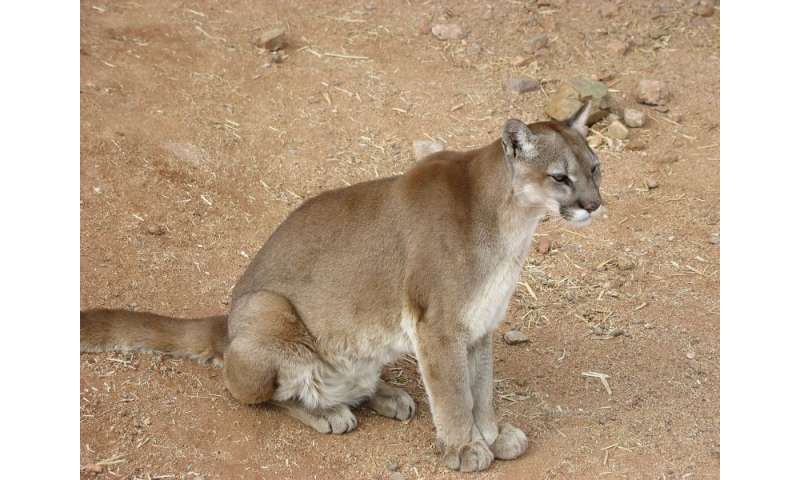Physical deformities linked to inbreeding discovered among cougars in the Santa Monica Mountains
by Louis Sahagun
The discovery was heartbreaking for biologists, who consider the mountain lions of Southern California to be among the most threatened mammals in North America: a young male with the distortions of inbreeding—a tail kinked like the letter "L" and only one descended testicle.
The cougar found in the Santa Monica Mountains in March represented the first documented physical manifestations of extremely low genetic diversity within an isolated population of less than two dozen mountain lions still roaming the rugged canyonlands just north of Los Angeles.
Since then, scientists have found two more lions with similar deformities. Announcement of the findings was delayed by the coronavirus pandemic, officials said.
"This is something we hoped to never see," said Jeff Sikich, a biologist with the Santa Monica Mountains National Recreational Area and an expert on local mountain lion populations. "We knew that genetic diversity was low here, but this is the first time we have actually seen physical evidence of it."
Mountain lions are not a formally threatened species in California. But state officials earlier this year concluded that six isolated and genetically distinct cougar clans from Santa Cruz to the U.S.-Mexico border make up a sub-population that may warrant listing as threatened under the state Endangered Species Act. Such a step could limit highway construction and development on thousands of acres of real estate.
The California Department of Fish and Wildlife reviewed the species' status in response to a petition submitted by the Center for Biological Diversity and the nonprofit Mountain Lion Foundation, which argued that the populations constitute an "evolutionary significant unit" that should be listed as state endangered.
The California Fish and Game Commission is expected to make a final decision sometime next summer.
Recent scientific studies suggest there's an almost 1-in-4 chance that Southern California mountain lions could become extinct in the Santa Monica and Santa Ana mountain ranges within 50 years.
That's partly because of how difficult it is to diversify the gene pool for the dozen adult lions still prowling in the Santa Monica Mountains: The 101 freeway is a near impenetrable barrier to gene flow for mountain lions. In the Santa Ana Mountains, the 15 freeway limits the movement of a family of 20 cougars.
Sometimes, the animals manage to cross the freeways without getting hit.
"Just like climate change, extinction risk for Southern California's mountain lions is not a future threat—it's already here," said Brendan Cummings, the center's conservation director. "As California continues to encroach into wildlife habitat, they have become a test case as to whether we're capable of living in this large state with wild animals."
A team led by Sikich discovered the problem on March 4 while placing a GPS radio-collar on P-81, a mountain lion weighing 95 pounds and estimated to be about 1 1/2 years old.
A few days later, another male mountain lion, also with a kinked tail, was recorded on a remote camera in the same area. Scientists believe the two cougars may be related and perhaps siblings.
Review of remote camera footage taken in the eastern Santa Monica Mountains between the 405 and Hollywood freeways suggests that a third mountain lion in the area also appears to have a kinked tail.
They underscore the results of extensive genetic analyses conducted over the past two decades: Cougars in the Santa Monica and Santa Ana mountains south of Los Angeles have the lowest levels of genetic diversity ever documented in the West, said Seth Riley, wildlife branch chief for the Santa Monica Mountains National Recreation Area.
The only population with lower levels was in south Florida a few decades ago, when Florida panthers were teetering on the edge of extinction. "The really interesting, and worrying, thing," Riley said, "is that they saw the same type of kinked tails and cryptorchidism" among Florida panthers.
Cryptorchidism is a condition in which one or both testes fail to descend from the abdomen into the scrotum.
In the face of such a dire prognosis—what biologists call an extinction vortex—conservationists are stepping up calls for construction of a $60-million wildlife overpass that would cross the 101 Freeway in Agoura Hills, one of the last places where natural habitat abuts the highway on both sides.
The bridge could help diversify the gene pool among the lions remaining in the Santa Monicas south of the freeway as well as in the Simi Hills and Santa Susana Mountains to the north, they say.
Because the bridge would cross the freeway, Caltrans is overseeing design and construction—but the transportation agency is not providing funding. Instead, roughly 80% of the funds are expected to come from private philanthropy and corporate donations.
As of September, the fundraising campaign had brought in about $15.4 million, including $3 million from the Santa Monica Mountains Conservancy, $2.2 million from the State Coastal Conservancy, $1 million from the Annenberg Foundation, $250,000 from the Leonardo DiCaprio Foundation and $100,000 from Boeing Co.
The project is currently in the final design phase, officials said. If fundraising stays on track, construction could begin in late 2021.
Farther south, however, conservationists are open to the idea of trans-locating mountain lions across the 15 freeway, even as they work with the California Department of Transportation on a relatively low-cost plan to improve freeway underpasses that would allow cougars freedom to roam.
"These lions' kinked tails are a genetic cry for help, telling us we must make it easier for them to move around and find mates," said Tiffany Yap, a biologist at the Center for Biological Diversity. "More wildlife crossings are part of it, but we need to stop sprawl developments that cut these beautiful cats off from each other."
©2020 Los Angeles Times
Distributed by Tribune Content Agency, LLC.